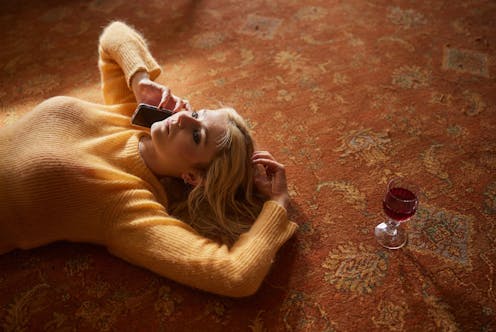New Aussie black comedy Totally Completely Fine explores suicide, grief, isolation – and the power of human connection
- Written by Emma Maguire, Lecturer in English and Writing, James Cook University

Chaotic 20-something Vivian (Thomasin McKenzie) can’t believe her luck when she inherits her granddad’s Sydney waterfront house. Decked out with grandpa-chic mid-century décor that suits Vivian’s vintage rocker aesthetic, the art deco home backs onto a stunning cliffside vista looking out over the ocean.
But it comes with a catch: Vivian’s cliff, with its sheer drop into the sea, is known as a place where people come to end their lives.
Vivian’s grandfather has left her in charge of saving these lost souls and preventing their deaths – a responsibility that seems insurmountable for Vivian, who can’t even seem to curb her own self-destructive ways.
It becomes clear if Viv is to take on the property she must face the trauma of the childhood accident that claimed the lives of her parents, repair her relationship with her brothers, and stop pushing away those who try to connect with her.
This six-part black comedy explores suicide, grief, isolation and the power of human connection.
Complicated grief
Through the character of Vivian, Totally Completely Fine looks at something called complicated grief[1], also known as Prolonged Grief Disorder.
Complicated grief occurs when the effects of grief remain pervasive and overpowering, interrupting the lives of bereaved people. As expert Katherine Shear describes it[2], those living with complicated grief often feel like they are facing a bleak future, can criticise themselves when they do feel pleasure, struggle with relationships, and may deal with suicidal thoughts.
Plagued by distorted flashbacks of the moments leading up to her parents’ death, and the accompanying shame and guilt, Vivian uses alcohol, drugs and detached sex to distract herself.
She takes on destruction as part of her identity, explaining to other characters she is “a ruiner”.
She pushes away everyone who could be a source of support for her.
Her siblings have their own particular responses to their grief. Viv’s oldest brother, John (Rowan Witt), locks down his emotions and becomes a control freak. Her emotionally open brother, Hendrix (Brandon McClelland), throws his life into creating the perfect family, even at the cost of his wife’s happiness.
Read more: What Prince Harry's memoir Spare tells us about 'complicated grief' and the long-term impact of losing a mother so young[3]
Human connection
The show’s ironic title echoes through the lives of the characters as they each struggle with their own difficulties while trying to appear to be totally, completely fine.
Highly strung PhD student Dale (Devon Terrell) struggles with anxiety. Charming paperboy Louis (Max Crean) has more going on than his chipper demeanour lets on. Hendrix’s wife, Laura (Mia Morrissey), hides how unhappy she is with motherhood. And Amy – a “jumper” (as the show describes those attempting suicide on the cliff edge) Vivian saves – hides the coercive controlling nature of her “perfect” fiancé.
In each of the characters’ lives, the show hints the support they need is right next to them, but none seem able to reach out for help. They become increasingly isolated, adding to their distress.
But John’s boyfriend, the handsome and emotionally intelligent Alejandro (Édgar Vittorino), models the compassion these characters need.
Where the relationships between Viv, John and Hendrix are weighed down by the baggage of their past, Alejandro shows the value of actively reaching out, listening – really listening – to people, and affirming their value as individual human beings.
Read more: How to ask someone you're worried about if they're thinking of suicide[4]
The taboo of psychological struggles
An old friend of Viv’s grandpa talks with her about suicide and the alienation felt by those who have attempted to take their own lives.
“Lots of people think that the line between them and what happens out there [on the cliff] is a thick one,” she says.
“Makes them intellectualise it, treat people like they’re fuckin’ aliens. When really you and I know that that line is as thin as the fucking wind.”
One in six[5] Australians will have thoughts of suicide at some point in their lives. It is common for people not to tell anyone[6] about suicidal thoughts, and it remains a taboo in contemporary society. This can compound effects of psychological distress by increasing feelings of shame and isolation.
Totally Completely Fine opens up this discussion in a human, heartfelt way without ever being cheesy or didactic.
As Vivian stumbles through a journey to healing, she makes mistakes and hurts the people she cares about. But the series ultimately shows the value of friendships, family and chosen family. Even though the characters all have their own pain to cope with, they find ways to be there for one another even when things seem hopeless.
This is a black comedy with huge doses of heart and hope.
Totally Completely Fine is on Stan from today.
If this article has raised issues for you, or if you’re concerned about someone you know, call Lifeline on 13 11 14.
Read more: Most people thinking about suicide don't tell anyone. Here's why and what we can do about it[7]
References
- ^ complicated grief (theconversation.com)
- ^ describes it (prolongedgrief.columbia.edu)
- ^ What Prince Harry's memoir Spare tells us about 'complicated grief' and the long-term impact of losing a mother so young (theconversation.com)
- ^ How to ask someone you're worried about if they're thinking of suicide (theconversation.com)
- ^ One in six (www.beyondblue.org.au)
- ^ not to tell anyone (theconversation.com)
- ^ Most people thinking about suicide don't tell anyone. Here's why and what we can do about it (theconversation.com)

















